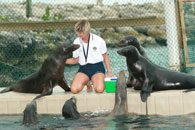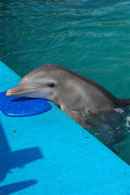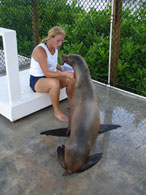Learn about Marine Animal Life - Tips for future Marine Mammal Trainers
"We see ourselves as animal welfare advocates from the perspective that we do influence animals by our very existence. As caretakers of the planet we have the responsibility to take care of animals and help others to act responsibly. Public education is one of the primary ways we can help the animals in our care as well as those in the wild."
- Martha Benaroya, John G. Shedd Aquarium
Do you want to be a
marine mammal trainer?
 Marine Mammal Director and Sea Lions
Marine Mammal Director and Sea Lions
There are many avenues to choose from among marine careers: animal training, education, research, veterinary care, stranding networks, conservation groups and wildlife studies to mention just a few. As you explore your opportunities to work in one of these marine fields, you may find that working with marine animals becomes your ambition and goal.
A career as a marine mammal trainer is both challenging and rewarding especially for Bahamas animal life. Like many other professions, it is a very competitive field, requiring a great deal of persistence and dedication. Here is some information that will help you discover what further skills and education you should pursue should you choose to follow this career path.
What kind of education
is recommended?
In reviewing an application for a potential trainer, many marine facilities will prefer candidates with a college degree or formal education. Some of the majors that would apply include zoology, marine biology, psychology, or animal behavior.
Other fields are acceptable of course, but any background or courses in the above mentioned fields will be very helpful. There are several schools in the U.S. that offer degrees in marine sciences.
For kids or young adults interested in the field, there are many opportunities of which to take advantage, beginning with your local library and the Internet. Explore your interests through books and computer resources available to you. Find out what aspects interest you most — research, education, training, veterinary care or even environmental politics.
Look into internships, field trips or assistant trainer programs with your local aquarium, zoo or marine facility that study Bahamas wildlife.
What does it mean to be a marine mammal trainer?

Gussie Mae
The duties and responsibilities of a marine mammal trainer are varied. The trainers are responsible for the complete daily care, feeding, and maintenance of the animals.
Training sessions and presentations are performed throughout the day. Thus, there is a great deal of repetition in presenting the animals to the public but also a similar degree of challenge in creating and training new behaviors with the animals.
Behind all the glamour of working with the animals in the public is the majority of an animal trainer’s duties called “animal care.” Each trainer is responsible for keeping animal areas and pools clean and sanitary. Trainers learn water quality testing, food preparation and daily administration of food.
Large amounts of fish are thawed and stored, then weighted and distributed to various animals every day. Daily records are kept on each animal, recording food intake, performance and observed state of health.
Trainers must also become familiar with the correct procedures for handling marine mammals, whether it be for physical examinations by the veterinarian or for moving animals around within a facility.
What about experience with animals?
Prior animal experience is another attribute that is definitely a plus when applying for a training position with marine mammals. This doesn’t necessarily mean previous marine mammal work, but may include such things as dog or horse training, volunteer work at a zoo or aquarium, or veterinary assistant experience.
If you live near an ocean coast, call your local marine mammal stranding network and volunteer to assist with marine mammal strandings. All these activities can familiarize a person with aspects of caring for animals.
What other considerations are important in pursuing a marine mammal career?
 Sea Lion in Training
Sea Lion in Training
Good Physical Health
Marine mammal training is a physically active job and the moving and handling of marine mammals and their food is strenuous work. A good physical health and athletic ability are essential. Additional certifications in scuba diving, lifesaving, or other physical activities are assets to include on your resume.
Public Speaking
The ability to address the public is a valuable tool to acquire. Trainers are responsible for narrating various presentations to the public, such as educational lectures or dolphin experience programs. They also deal a great amount directly with the guests, answering questions, assisting with problems and most of all, always being courteous and friendly. Many times trainers take part in special presentations for school children, individuals with special needs or VIP guests.
Relocation
Depending upon the facility to which you apply, the flexibility to relocate may be preferred. Some facilities have several parks and may transfer trainers periodically.
Also, because of the limited number of marine facilities, position openings at any given facility will be rare and infrequent. Thus, it may be to your advantage to consider applying to facilities beyond your local area, even internationally.
Is An Apprenticeship Required?
Due to the specialized nature of the work, on-the-job apprenticeship training and supervision by a veteran trainer is necessary.
Even if a person has had previous experience as an animal trainer, he must go through this period both to learn the methods of training used at a facility and to become familiar with the feeding, behavior and care of the specific animals with which he will be working.
The length of the apprenticeship depends upon the individual’s ability to master the training concepts, apply those methods, and the standards of that particular facility.
What organizations are recommended to join for more information?
Depending on your interests, there are a number of organizations that offer information helpful for a marine career.
Membership to the International Marine Animal Trainers Association (IMATA) includes four periodicals called “Soundings” with articles on animal training, education, conservation issues and listing of available internships and job openings.
IMATA also hosts an annual conference in which trainers and educators from all over the world gather to present papers on topics relevant to the training and care of their marine mammals. Proceedings listing the topics covered at the conference are available to all members.
Other organizations that may prove helpful for career opportunities would include the National Marine Educators Association (NMEA), the Alliance of Marine Mammmal Parks & Aquariums (AMMPA), the American Zoological Association (AZA), and the Internation Association of Aquatic Animal Medicine (IAAAM).
The Internet:
Interested In A Career In Marine Sciences?
You’re In The Right Place!
The website of marinecareers.net will introduce you to a wide range of marine career fields and to people working in those fields. In addition, it will give those men and women a chance to tell you what they like and dislike about their careers, what they see in the future in their fields, and much more. This site will also provide you with some experts’ views on what the future holds for marine science careers.
www.marinecareers.net
In recent years, the Internet has developed into a valuable resource for education and career information. Take the plunge and surf the Web through the trusted websites we have listed below!
www.marinemammalogy.org
www.marine-ed.org
www.ammpa.org
www.iaaam.org
www.imata.org
www.aza.org
Are you ready
for the challenge?
A career in marine mammal training offers an exciting and unique opportunity to work with some of the world's most fascinating and intelligent creatures, especially Bahamas animal life. With a limited number of positions available world -wide, a person should also explore other careers that offer opportunities to work with these animals — such as veterinary care or conservation management of Bahamas wildlife marine mammals in their natural habitat. Good luck in all your efforts!!!
Dolphin Encounters
Education Department
Email:
Click here for downloadable/printable information on Marine Careers

